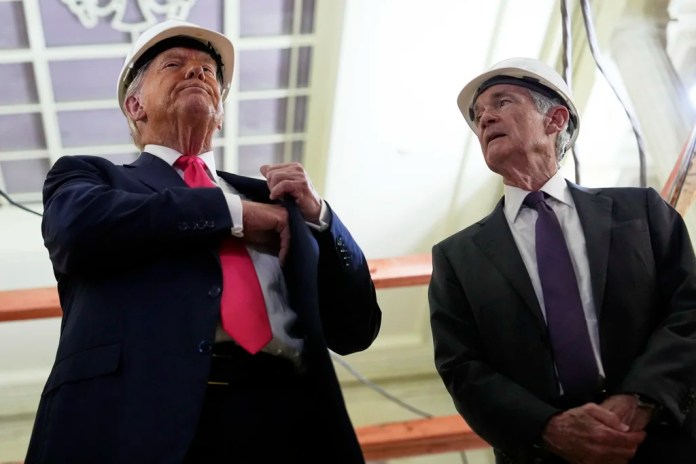Trump eyes privatizing USPS: What he plans for the Postal Service
president-elect Donald Trump has announced that his management is considering the privatization of the United States Postal Service (USPS), which has faced important financial challenges and losses in recent years. Trump previously proposed similar ideas during his frist term and remarked that the notion of privatization is not entirely negative. While he acknowledged that there is interest in this idea,specific plans for implementation have not been detailed.
The USPS has been unprofitable for several years, with a reported $9.5 billion loss in the last fiscal year largely attributed to a decline in mail volume and the need to maintain a universal service obligation. Privatization could possibly reduce government spending but may also lead to ample job losses and disrupt businesses that depend on USPS for delivery services, such as Amazon.
However, the feasibility of privatization remains uncertain due to the complexities of dismantling a longstanding institution and the limitations on Trump’s authority to unilaterally make such changes. The USPS is constitutionally established, and any significant restructuring would require legislative action.
Trump eyes privatizing USPS: What to know about his plans for the Postal Service
President-elect Donald Trump said Monday that his incoming administration is “looking at” privatizing the United States Postal Service, which has been notoriously unprofitable.
The plan is not a new one for Trump, who floated a similar restructuring during his first term in the White House. He has not taken a firm stand on overhauling the institution that is older than the country itself, but he said Monday that it was “not the worst idea I’ve ever heard.”
Here is what you need to know about the brewing effort.
What is happening with USPS?
It is not clear exactly what privatizing the USPS would look like, but any move to change the way the system operates would be a heavy lift for Trump.
On Monday, he acknowledged that “there is talk about that. It’s an idea that a lot of people have liked for a long time,” but he didn’t offer specifics about what moving forward would look like.
The system has not been profitable for several years, and privatizing mail delivery would help Trump’s Department of Government Efficiency fulfill its promise of cutting spending. But the change would also kill hundreds of thousands of jobs and interfere with private businesses such as Amazon that often rely on the USPS for “last-mile” delivery between its fulfillment centers and consumers’ homes and businesses.
The organization’s unprofitability has often emanated from the fact that it has a “universal service obligation” to the public and provides service regardless whether it makes money or not. The agency lost $9.5 billion in the fiscal year ending Sept. 30, largely because of decreasing consumer mail volume.
Is privatization feasible?
Besides the logistical complications of winding down an agency that is deeply embedded throughout the country, Trump also will not have the authority to dissolve the USPS on his own.
Establishing post offices is an explicit authority Congress is granted in the Constitution, and while Trump could push Congress to privatize the system, it is more likely that he will alter the agency in more subtle ways.
Such an initiative would likely be complicated for Trump, but it could save the government a substantial amount of money at the risk of losing a substantial number of government jobs and shirking some consumers who use the service in remote locations.
How would the change affect the mail?
The privatization of the USPS would likely increase mail and shipping costs for consumers, who would increasingly rely on other private companies such as UPS, DHL, and FedEx for their needs.
There would also be increased difficulties in delivering mail to rural communities. Because the USPS has a “universal service obligation,” it is required to deliver parcels to homes and businesses all over the country, regardless of how far away an address is or whether it can make a profit by completing the delivery.
Short of completely privatizing the agency, USPS could opt for a partial split, relying on shipping distributors such as UPS to deliver small packages while federal employees deliver other types of mail.
The USPS’s first-class mail service would be more complicated to privatize because it involves postage and only the postal service is allowed to carry such mail. That would require a different set of laws to change or be rewritten to allow the division of service.
Cuts that could save the agency
If the agency managed to turn around its dire fiscal situation, Trump might be more amenable to letting it continue to operate as part of the government.
In addition to its losses last year, the Postal Service has roughly $80 billion in liabilities, according to the Washington Post.
A gaping budget problem was posed by the agency’s 10-year, $40 billion strategy of investing in its Next Generation Delivery Vehicles, a fleet of electric vehicles that were supposed to start arriving but have been delayed by myriad problems.
Oshkosh was supposed to have delivered 3,000 of the EVs by this year, but the agency has only received 93 trucks so far. The total order was for 45,000 vehicles.
Reuters reported that Trump’s transition team is considering canceling the agency’s contracts with Oshkosh and Ford for a new fleet of electric mail trucks. And DOGE co-Chairman Elon Musk suggested he would support the agency letting consumers opt out of receiving physical mail.
" Conservative News Daily does not always share or support the views and opinions expressed here; they are just those of the writer."




